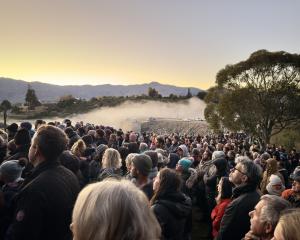In mid-July 1916, virtually an entire company of the Otago Battalion was wiped out in an ambitious night-time raid in the Armentieres sector in northern France.
Otago knew few darker days in World War 1 than mid-July 1916 when virtually an entire company of the Otago Battalion was wiped out.
Following the Victorian custom, curtains were drawn at homes throughout Dunedin and the province; inconsolable mothers and sisters would have donned black - some for the rest of their lives.
Families and friends everywhere read or learnt of the grim news. Columns of names of the dead, wounded and missing were read on afternoons in the Evening Star and during the morning in the Otago Daily Times. The population of Dunedin was then about 55,000 - a small enough city for the local names to be familiar to many: boys from school, perhaps from Saturday afternoon sport, or a friend of a friend who lived down the road. The toll of war was not just on the battlefield.
The curtains were shut tight at 400 Leith St. Inside, Catherine and Allan Blackie mourned the loss of their fourth son, Jim, and their youngest, Ron. A daughter who was a nurse, Catherine, had escaped drowning in the sinking of the Marquette just eight months before. It all proved too much for mother Catherine. She died in February the following year.
The cause of all the death, suffering and grief came when the Otago Battalion was called upon to mount a night-time raid in the Armentieres sector in northern France. Raiding was a common practice to assess the strength of the enemy, perhaps grab a few prisoners and find out what regiments opposed them; the very word "raid'' implies a quick in-and-out, something the New Zealanders were good at. But this one was different. Rather than a small group, about 200 men - mostly from the 4th Otago Company - trained for the raid in Armentieres. There were reservations. Alexander Aitken, the Dunedin mathematician who was then a sergeant, thought it was of "ambitious scope''. There were also fears, in part prompted by the desertion to the enemy of a Wellington Battalion soldier, William Nimot, a few days earlier, that the Germans knew what was coming.
The Official History of the Otago Regiment cautiously observed: "During the afternoon the enemy had carried out a certain amount of artillery fire which had all the appearances of a ranging shoot. The misgivings and suspicions aroused in not a few minds were later only too fully confirmed.''
Or as a soldier writing home said: "Old Fritz had evidently got wind of our attack ...'' The well-worn tactic was for the men to go in after an artillery barrage aimed at cutting wire and keeping German heads down. But when the Otago men advanced, led by the company commander, William David Jolly, of Cromwell, they advanced to their deaths. "A concentrated and murderous shrapnel and machine gun fire fell like a thunderclap over No Man's Land between our front line and the objective,'' the Official History said.
Some men were killed instantly, others were wounded and died before stretcher-bearers could get to them; still others managed to get back to safety, only to die later. In the dark and the noisy and frenzied confusion, it was difficult to be precise next day about what had happened. Some who could have known were dead. It appeared that Jolly saw instantly it would have been suicidal to carry on the raid so he fired a rocket indicating withdrawal. He was wounded, but refused to lie on a stretcher while some of his men still needed to be found and looked after. Not long after, he received a second, fatal wound.
Where there were dead men, there were also heroes. Jolly was one of them; so too a man unnamed at the time who had been sentenced to imprisonment for a list of breaches of military law longer than most arms. War correspondent Malcolm Ross, constrained as always by censorship which did not allow the naming of names, wrote: "A private, under suspended sentence of five years' imprisonment with penal servitude, behaved with great heroism. He was seen boldly standing up under heavy fire, repeatedly lifting wounded men over the parapet.''
Ross knew, as all the soldiers would have known, the man was one of the most talked-about in the New Zealand Division: James Douglas Stark from Invercargill, otherwise known as "Starkie'', who seemed to loathe authority and Germans in equal measure. Aitken wrote of him: "He was wounded, but went back over the parapet at least a dozen times, bringing in a wounded man each time and at dawn had to be restrained by main force - a hot-tempered and impulsive man - from going out again.''
Robin Hyde's book, Passport to Hell, was published as a novel; but it was for the most part the non-fiction of Starkie's life.
"The whole affair was a tragedy,'' Arthur Byrne wrote in the Official History. He was in no doubt that the Germans somehow knew what was coming.
All told, 35 were killed; and 122 were wounded. By comparison with some battles in the First World War, especially a fortnight earlier for the British on the first day of the Somme, such numbers may not seem unduly high. But proportionately, coming from one of four battalions from a small country, they were a grievous loss. The Otago Battalion was reduced from four companies to three until reinforcements could be found and trained. "The 4th Company might be regarded as extinguished,'' Aitken wrote.
It was two days after this that Captain James Hargest, another of the battalion's company commanders, called upon Aitken's extraordinary powers of recall. (Hargest himself was one of the heroes, going out to retrieve wounded men). The roll for Aitken's former platoon had been lost in the fighting and without it, a full list of casualties could not be compiled and the fighting state of the platoon assessed. Aitken was lying on a cot in Hargest's dugout suffering from what he thought was minor shell-shock. He overheard Hargest's conversation about the roll and offered to provide details. From his temporary sick-bed, he dictated the service number, rank and full name of every man in the platoon - somewhere between 20 and 30. He also added home addresses and next of kin.
The story of Aitken's memory spread and grew in the retelling. He said he attached no particular importance to the feat of memory - adding years later that it was something any schoolteacher should be able to do about a class - but others saw it differently.
Well after the war, the story was retold at a dinner in his presence and the platoon had been expanded to a battalion.
One of Jolly's sons, Douglas, became a doctor and served as a volunteer for two years in the Spanish Civil War and was described by an American medical historian as "one of the most notable war surgeons of the 20th century''.
- by Ron Palenski












